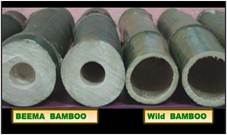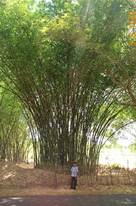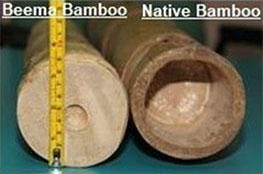Beema Bamboo is NOT a product of Genetically Modified Organisms (GMO), the clone was developed from Naturally Occurred Half Sibs which was derived out of Open Pollinated Population. The selected clones were further purified by selective breeding and the Superior Characters are fixed by Asexual Propagation through Micro Propagation in a Tissue Culture Lab.
Beema bamboo is sympodial bamboo with the clump forming rhizome (but the monopodial bamboo is invasive by rhizome) andnew culms only grows around the mother shoot.Hence, Beema Bamboo is a non-invasiveclumping variety. The species Beema bamboo is sterile because of its aneuploid nature with 2N chromosomal number of 70, instead of regular chromosome numbers of 2n=72. Since the bamboo is sterile, they do not produce any seed and through seed it will not become invasive. Since it is sterile, the bamboo does not die for several hundred years and keeps growing without death. This means the bamboo forms permanent green cover.
Unlike most bamboos, tissue cultured Beema Bamboo culms grow nearly solid and adapt to various soil and climate conditions. After every harvest cycle, it regrows and does not require replanting for decades.
Overview
Bamboo is the fastest growing plant with wide variation in species and product manufacturing. It occurs in many parts of the world as wild. Research in bamboo and field trials at Growmore Biotech Ltd let to the domestication of bamboo as a valuable crop plant for wide range of application, starting from energy generation, environmental cleaning, carbon sequestration, product manufacturing.
It is important to choose the right species and adopt best agronomical practice as per the local environmental condition, soil factor, water availability and end use of bamboo. Experienced team of ours can guide you in this matter.
It's rhizome and root development provide a strong foundation, making the plant robust against natural forces and serves as simple and cost-effective solution for global warming.
It is one of the best commercial plantationseither as a pure crop or mixed crop for the farmers to generate additional income from land that are not suitable for regular agriculture.
In the last decade, the awareness of bamboo has increased and opening up opportunity for several large scale industries to use bamboo as a raw material.






